Is there ANY other country on earth that sounds more off-putting to Westerners? Iraq has been associated with war and other forms of political instability for as long as most of us can remember. It's been a byword for conflict ever since the 1980s when it featured on the TV news about the Iran/Iraq war. That's 40 years and counting!
No one in their right mind would send money to Iraq, right?
Even I hesitated and wondered if this subject was pushing it a bit too far. In the end, it was this deep-seated, widespread pessimism that made me take a closer look.
Quite often, when there is a widely-held belief that few people care even to question anymore, it turns out that the tide has already started to turn – without anyone noticing yet.
I wanted to know:
- Does Iraq have a much higher perceived risk than is actually the case?
- Are the 103 publicly-listed Iraqi companies trading at ultra-low valuations?
- What could be a trigger for a re-rating of the Iraqi market?
I found some surprising answers to these questions. What's more, I can even name an investment that is affordable for retail investors. Non-US investors can buy it for USD 10,000, while investors from the US will need to stump up USD 25,000 (still reasonable, if you ask me).
This is the story of Iraq as a frontier country investment and why we may soon need to shift our long-held view of the country.
A brutal seven-year bear market and a little-noticed rally
Today's Weekly Dispatch wouldn't be possible without the events of 18 April 2004 – coincidentally, also my 29th birthday!
That day, the Iraq Stock Exchange (ISX) was created by the occupied country's provisional authority - a significant step forward, despite its initial basic setup using pen and paper to record trades. Iraq had just started to emerge from the Second Gulf War and the subsequent fall of Saddam Hussein. When you set out to rebuild a country after decades of dictatorship and seemingly never-ending wars, launching a stock market is a highly symbolic move.
The media bandied around the usual comparison with Germany's rise after the Second World War and how early investors made a fortune building businesses out of the country's bombed-out ruins. Some thought that Iraq was about to achieve something similar.
Iraq's stock market got off to a good start, even though it had just 18 publicly-listed companies initially. Professional frontier investors ploughed money into the few available stocks, foreign corporations funnelled direct investment into the country, and there was an atmosphere of departure from the old, troubled times.
Little did they know…
During the ensuing years, Baghdad became a byword for suicide bombings and never-ending political instability of the worst kind. The Iraqi capital had to be divided into sectors, with all governmental activity located in the heavily fortified "Green Sector". The entire city had checkpoints on every other corner, and its residents faced genuine risk to their daily lives. The situation stifled economic development.
The years from 2010 to 2013 brought some stability and respite, supported by an oil price of around USD 80 per barrel. Iraq's economy was heavily dependent on the income from oil, and having lots of petrodollars flowing into its coffers helped to keep things together. The stock market experienced significant inflows, and the number of publicly-listed companies grew to its current level. It looked like Iraq was finally starting to move in the right direction.
Then came the perfect storm that started in 2014. The oil price collapsed to USD 40 and an Islamist militant group, ISIS, invaded and occupied a third of the country.
The Iraqi stock market entered a brutal seven-year bear market, as summarised by the performance of the Rabee Securities Iraq Stock Exchange index ("RSISX"):
2014: -25.4%
2015: -22.7%
2016: -17.3%
2017: -11.8%
2018: -15.0%
2019: -1.3%
2020: -5.3%
Based on US dollars, the RSISX lost up to 67% from the end of 2013 to the end of 2020.
It was only during the first half of 2021 that the market started a significant recovery. Between January and April 2021, it gained up to 29.2% - quite a move! It's consolidated since then, primarily because of uncertainty about the upcoming election in October 2021. However, it's currently still up 15.5% for the year.
There hasn't been much reporting yet about the recent movement of the Iraqi market. When a market rallies without anyone reporting about it, my interest is piqued.
Has the Iraqi market just seen the first signs of a revival? Might a longer-lasting, fundamental shift be underway?
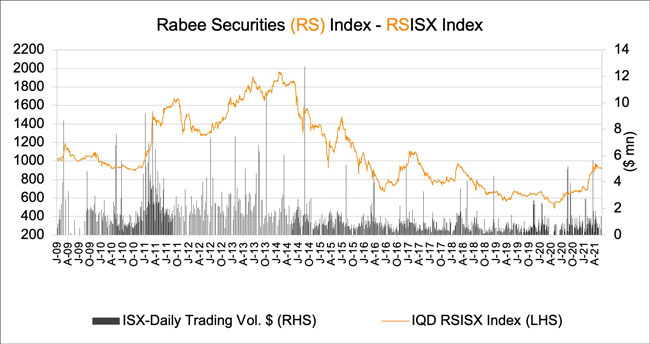
The US dollar-based stock market index of Iraq, provided daily by Rabee Securities.
A frontier market that is showing signs of life again
Any analysis of the Iraqi stock market needs to take into consideration just how underdeveloped the country is. It is a frontier country in the true sense of the word.
- Since the 1980s, Iraq's capital Baghdad has grown from 2m people and an estimated 150,000 cars to nearly 10m people and probably closer to 2m cars today. Its infrastructure remains a mess, though, with almost no investment having taken place since the 1980s.
- 80% of the population don't have a bank account, and 90% of the economy is based on cash. This may seem surprising, given the large number of banks operating in the country – 42 of the 103 publicly-listed companies are banks! Rather than serving Iraqi consumers, though, these banks primarily act as service providers for areas such as trade finance.
- Even though mobile phone penetration is at 90%, many Iraqis can't afford to pay for data signals but access the Internet through public Wi-Fi networks instead. This goes to show that even some of the basics are missing in the country.
By Western standards, Iraq is stuck in a time warp. The country is decades behind.
Yet, I also detected some exciting signs.
The stock market's rally from January until May 2021 was driven mainly by local retail investors and foreign investors. It's a good sign that it wasn't just a single group driving the market. In case you wonder, domestic institutional investors didn't contribute to the rise – simply because there are no domestic institutional investors (yet)!
Some of the publicly-listed Iraqi corporations announced they have started to invest again:
- Baghdad Soft Drinks (ticker symbol: IBSD), the local Pepsi bottler and one of the market's blue chips, took over a competing juice and water bottler.
- National Bank of Iraq (ticker symbol: BNOI), another blue-chip company, decided to buy the Iraqi branch network of Bank Audi, the crisis-ridden Lebanese bank.
- Two of the publicly-listed telecom companies, AsiaCell Communications (ticker symbol: TASC) and Zain-Iraq (ticker symbol: TZNI), are continuing their rollout of a 4G network to improve Internet access.
When major domestic companies engage in such large-scale investment, it provides reason for optimism.
I managed to speak to Aysegul Ozge Ozgur, Head of Research at Rabee Securities, the leading brokerage firm in the country. She told me the following about the current activity in Iraq's corporate sector
"We see such acquisitions rarely in Iraq; however, such movements help the corporates to save time and money by considering the difficulties in Iraq for establishing a new factory, a branch, or even at the first step to find the right location and the suitable land to do that. While such acquisitions create some optimism in the market, the main triggering factors for the stock market will be the establishment of a custodian, listing of oil-related sector companies, because there are no oil sector companies listed on the ISX, listing newly established companies mainly the high-tech companies, and listing some state banks that are the major players in the Iraqi banking sector. Separately, if the government prioritizes the privatizations because there are a lot of state institutions that are far behind the world, that will inevitably increase the efficiency in the economy and might create more opportunities for listing on the ISX."
Looking at the broader economy, I also found a whole range of interesting developments:
- To deal with the housing shortage, the government is pursuing a programme of building 1m new apartments. It already completed nine new residential districts and will start work on another 18 such communities in 2021.
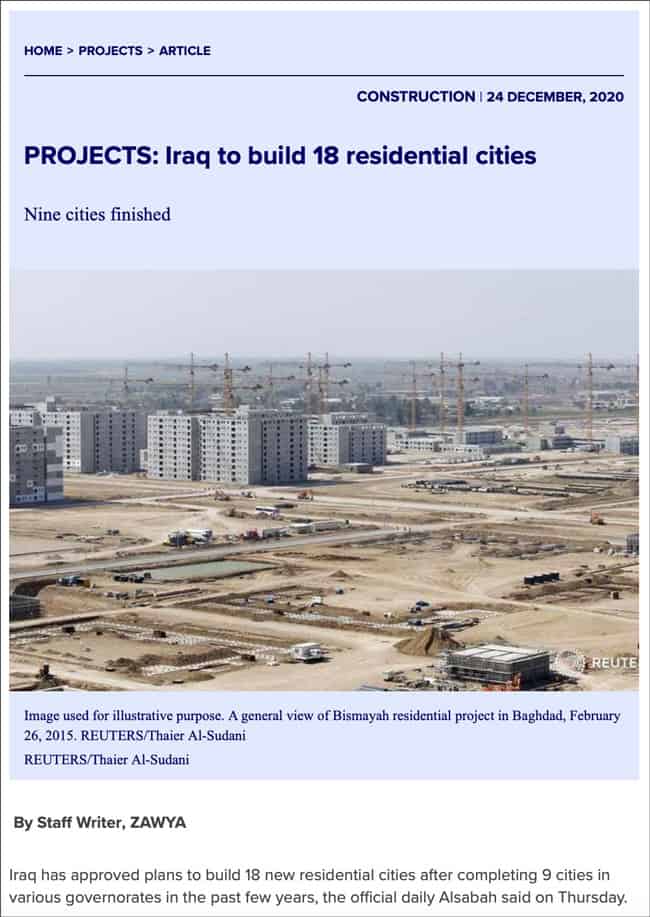
Source: Zawya, 24 December 2020.
- In 2022, Iraq wants to start work on a metro system. The project was awarded to the French transport giant Alstom, and it cleared the last remaining hurdles in April 2021.
- Baghdad Airport has plans to grow. (Fun fact, John Menzies plc (ISIN GB0005790059), a London-listed airport service company that I looked at in much detail in August 2019, expanded into Iraq last year!)
The economic progress taking shape in Iraq has also triggered the interest of Iraqi retail investors. Rabee Securities has started to sponsor a weekly TV programme about Iraq's stock market. It launched on Iraq 24 Channel in February 2021 and is the first programme of its kind. Besides weekly analysis of the market it also features guests from the top managements of ISX-listed companies. Any of my readers who speak Arabic will find the first 15 episodes on the YouTube channel, Rabee Securities Media.
There is even venture capital activity in the Iraqi e-commerce sector. There is a local version of Amazon, which recently raised its second round of seed funding.
Does this sound like a country about to disappear down the toilet? Hardly so
Without a doubt, Iraq has its own set of political risk. This isn't Switzerland or Norway, and you can't even compare it to emerging markets like Egypt or Kenya. It's a war-torn country with one of the world's most underdeveloped economies. The progress mentioned above is set within a broad set of economic, political, and societal challenges:
- Too much of the current investment in Iraq is driven (or managed) by government agencies. Delays, cost overruns and lousy planning are inevitable.
- Parts of the country remain starved of investment. E.g., the city of Mosul in northern Iraq was largely destroyed during the conflict with ISIS. Many of the 1.2m residents are still waiting for basic services to be resumed as well as compensation for property damages. Property prices in Mosul are down 75% since before the conflict.
- There are still around 2m displaced people within Iraq, and additional ones in neighbouring countries.
However, such problems are also the very point of investing in frontier countries. The idea behind frontier investing is to go in at a very early stage. The term "ground-floor opportunity" is used too often nowadays, but Iraq is a country that truly deserves this description.
At this early stage, expanding a business in Iraq can be as simple as introducing new consumer brands. Baghdad Soft Drinks is planning to get the license from the Pepsi Company to distribute the Tropicana brand. It's literally like the Eastern Bloc after the fall of the Berlin Wall when local consumers were excited about finally laying their hands on foreign consumer brands.
All of this is driven, in parts, by a new generation of Iraqis. 59% of the population are younger than 25, and they won't have active memories of Saddam Hussein's reign (he was ousted in 2003). This young generation has grown up free from state censorship and interference, but with unfettered access to the world through the Internet. Check out "A parallel Iraq – a thriving entrepreneurial culture has taken root", the definitive piece about these developments published in 2018 by the Entrepreneurship Initiative at the American University of Iraq-Sulaimani's (AUIS).
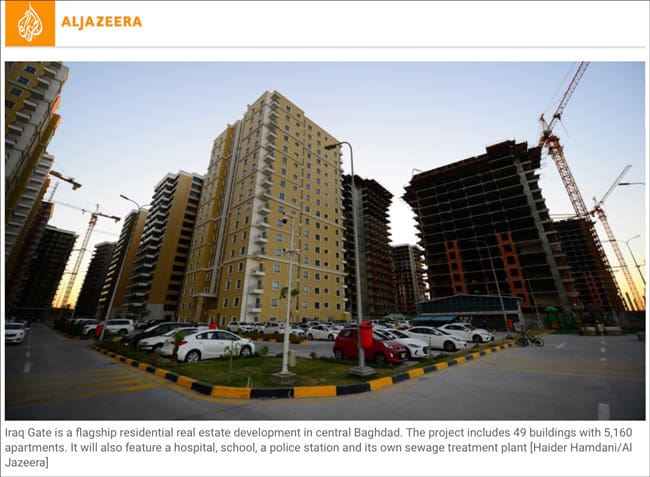
Source: "Iraq: The changing face of Baghdad's historic neighbourhoods", Al Jazeera, 9 September 2020.
A regional market with more people than Europe
In part 1 of this blog series on frontier country investing, I featured the changes taking place in Iran. It has since become even more likely that the new US administration will pursue a strategy of loosening sanctions against Iran. Whatever one thinks of politics (and I am the first one to be critical of appeasement), it's hard to deny that in the short term, this is going to lead to a rebound of Iran's economy, as well as an inflow of investment.
Could Iraq be next in line for renewed interest from investors? Once you look at these developments from a regional perspective, an interesting picture emerges.
Given the events of the past few years, many (including myself) believe that we are moving from a period of globalisation to one of regionalisation. Countries are more likely to orientate themselves towards nearby countries or members of their regional trade block instead of pursuing yet more globalisation.
Just like Iran, Iraq sits within a region of 550m consumers. Increasingly, corporations and investors in the region are looking for growth opportunities on their doorstep. As an example of how Iraq is already part of this, the country recently built the infrastructure to connect to the electricity production of Jordan and also to that of Kuwait. In the 1990s, Iraq invaded Kuwait. Today, it's hooking up to Kuwait to become part of an emerging power grid spanning the region. Who would have thought!
Iraq is the third-most populous country of the region, behind Iran and Turkey. The country has nearly 40m consumers, demographics that are highly favourable to selling consumer products, and the potential to see its population grow to 50m by 2030. Corporations and investors in the region will only be too aware of Iraq's potential. If economic connectivity in the region continues to be on the up, there is a good chance that Iraq will simply get swept up along the way.
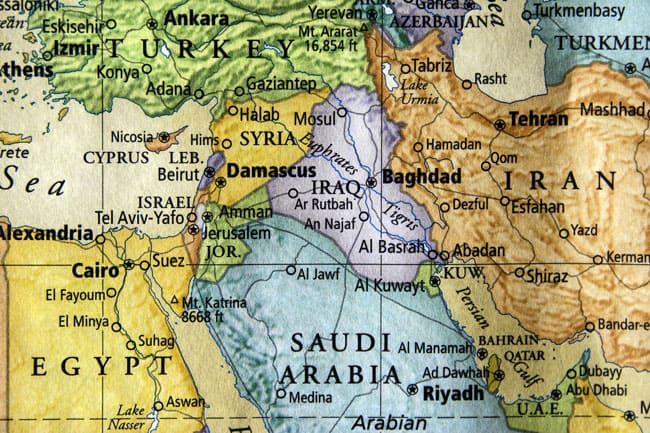
Iraq sits at the centre of its region and has borders with six countries as well as (little-known) access to the Persian Gulf.
Throw in the current favourable dynamics driving the oil price, courtesy to the West's misguided policy of reducing its production of fossil-based fuels before alternatives are in place. Between 2008 and 2018, a whopping 73% of the world's increase in oil production came from the US shale energy sector. When the Biden administration stopped the further development of the US shale energy industry, it presented a massive gift to oil-producing countries like Iraq. Many billions of purchasing power of American and European consumers will now flow to countries like Iraq – and starting immediately, given the oil market's reaction and the resurgent oil price.
Iraq not only has the world's third-largest oil reserves, but also some of the lowest production costs. Now that oil is back up at USD 70 per barrel (and with real potential to reach USD 80 or even USD 100), the country's extreme leverage towards oil could yet again reap dividends. It's almost like Biden introduced an "Iraq Solidarity Tax" levied on American and European consumers. The tax gets collected at the gas pump, and much of it is sent straight to the Middle East.
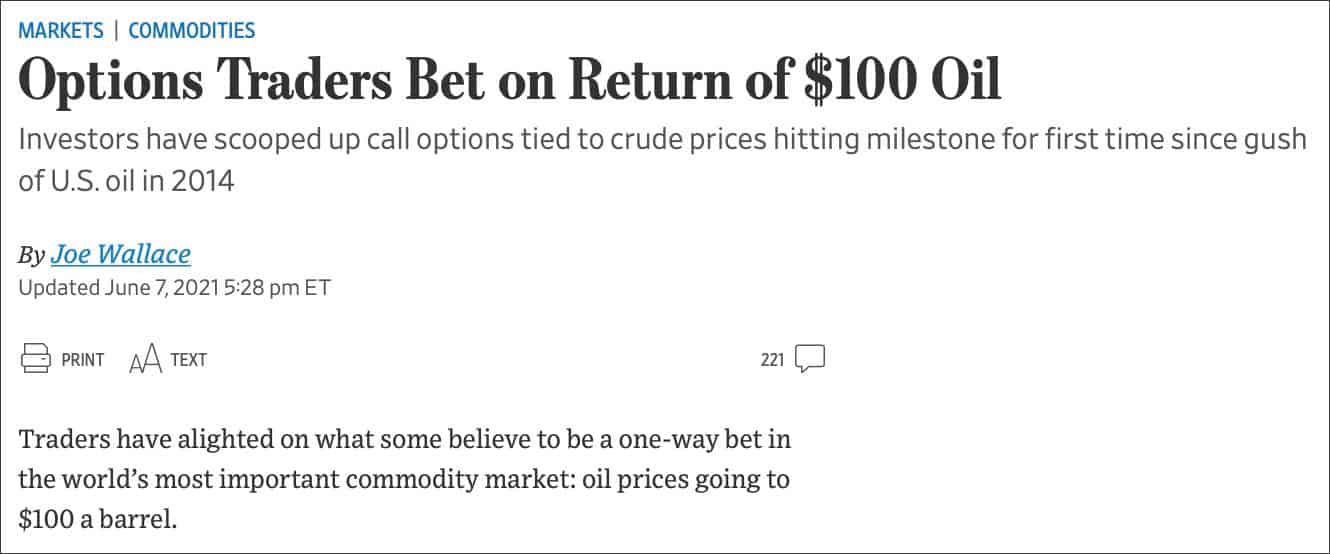
Source: The Wall Street Journal, 7 June 2021.
After suffering through the perfect storm from 2014 to 2018, Iraq might now be lucky enough to experience a period of several benefitting factors. No wonder there is renewed activity on its stock market. Throw in the stocks' low valuations, and we might be onto something interesting after all.
Structurally depressed earnings and the first inklings of a start-up movement
On the surface, Iraq's stock market does not appear to be cheap. The market's price/earnings ratio is around 12 and stocks tend to trade at a price/book ratio of about 0.5. Dividend yields average about 4.5%. On the whole, this makes Iraqi stocks not all that much cheaper than many European stocks.
Why my interest, then?
These headline figures don't give the whole story. Company earnings in frontier countries are artificially depressed:
- To cope with a country's underdeveloped infrastructure, companies keep an excessive amount of inventory. They plan for "just in case" rather than "just in time".
- Companies do not yet use modern IT systems but are running processes manually or with pen and paper.
- Where companies lend, they have to pay interest rates of up to 16% p.a. On the other hand, many companies keep large amounts of cash just to be on the safe side. Using overpriced financial leverage or letting cash sit around unused is very inefficient. Iraq's corporate sector lacks any kind of financial optimisation.
It all leads back to the idea of a ground-floor opportunity. In Iraq's economy, companies will be able to grow and increase profits simply by putting into place what would be considered basics elsewhere:
- Given that 80% of Iraqis do not have a bank account, local banks have barely begun to do business. Imagine banks rolling out accounts and starting to offer basic services, such as overdrafts. Iraqi consumers are completely unlevered because they've never had access to lending. The banks' earnings are currently low, but the size of their market can multiply once financial activity picks up. (One can argue whether the business will be done by banks or by newly-created FinTech firms.)
- Mass penetration of mobile data services has only started, and that Tropicana juice has yet to arrive on the shelves of Iraqi stores.
- The retail industry is mainly based on mom and pop stores, which provide neither low prices nor convenience. Once supermarkets and e-commerce companies start to move in, they'll soak up business like a dry sponge.
Frontier countries tend to offer higher profit margins than most Western economies. As described in one of my previous research reports, underdeveloped countries in regions such as Africa tend to make it difficult for entrepreneurs to get a new enterprise off the ground. Once they succeed, however, the pay-off tends to be bigger because there is simply less competition.
It's probably with this thought in mind that a group of investors recently provided a second round of seed funding to Iraq's version of Amazon, Miswag. Official figures are difficult to obtain, but allegedly the company was valued at USD 20m and both seed funding rounds only amounted to a total of USD 1m so far.
Miswag wants to be for Iraq what DigiKala (privately held) is for Iran and MercadoLibre (ISIN US58733R1023) is for South America. At last count, the company already had an average of 8m monthly website visits, and a reported month-on-month growth of 25%. Among its corporate partners are Google, Cisco, and local players such as Zain Cash (a payments provider).
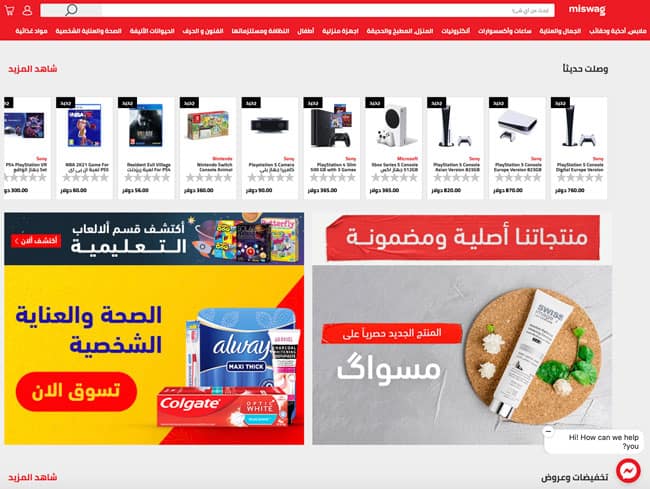
Miswag – Iraq's local answer to Amazon.
Unfortunately, Miswag isn't public yet, but it has already attracted Shwan Ibrahim Taha, chairman of Rabee Securities, as one of its first investors. It's probably just a matter of time before Miswag carries out its IPO on the Baghdad Stock Exchange, and I expect reports in the likes of the Financial Times and the Wall Street Journal if or when this happens. In two or three years, Miswag could be worth in the hundreds of millions and quickly become one of the largest companies listed in Baghdad. Such an IPO could send a strong signal to the world and reignite interest in anything listed on the Iraqi stock exchange. Investors from countries such as Dubai and Saudi Arabia are known to be hunting for such opportunities in the region.
Could such developments act as the catalyst for a surprise upward move of Iraq's stock market?
Right now, the market is still 60% below its 2014 record and has a market cap of just USD 10.4bn, meaning you could buy 103 of the largest Iraqi companies for the price of a medium-sized British retail company. The combined market cap of all publicly-listed Iraqi companies is equivalent to about 5% of Iraq's GDP, compared to neighbouring countries with market caps of around 80% of their GDP. Such comparisons are inherently flawed, not the least because there is no oil sector company listed on the Baghdad Stock Exchange even though the share of oil in the country's GDP is around 50%. Still, it gives you an idea of where the Iraqi market is at right now.
The Rabee Securities website gives an overview of all 103 publicly-listed companies on the Iraqi stock exchange.
When I read names such as Baghdad Hotel (ticker symbol: HBAG), Iraqi Agricultural Products (ticker symbol: AIRP), or Fallujah Construction Materials (ticker symbol: IFCM), my ears perk. These are just some of the names I would take a closer look at if I had the time to poke around the Iraqi market. Amidst all the excitement about potential e-commerce companies, do keep in mind that the playbook for frontier countries is always the same. Primary industries are usually a low-risk, low-maintenance investment for anyone who just wants to ride a country's re-emergence through a buy-and-hold strategy. Nowadays, you'd probably want to add a few e-commerce plays if they are available. In the absence of listed e-commerce companies, you could buy telecom companies as a proxy for the growth of the Internet and the general transition of a country to a more digitally-driven economy.
However, how to play all of this if you can't (or don't want to) fly to Baghdad and open a local brokerage account?
There is a fund for foreign investors, and there are no restrictions on who can buy into it. Unlike the two frontier market funds that I featured in part 1 and part 2 of this series, the minimum investment of this Iraq fund makes it relatively accessible.
Getting access to Iraqi stocks through a fund
I want you to be able to buy and sell your investments on a daily basis through a reasonably liquid market, which is why I don't usually feature non-listed investments.
However, there are cases where one has to make exceptions to a rule. For now, the only realistic way to get exposure to the Iraqi stock market is through funds.
One of the three available investment funds that give such exposure is the AFC Iraq Fund, managed by Asia Frontier Capital, a boutique fund management firm set up by a Swiss entrepreneur in Hong Kong. Friends in the industry recommended AFC to me; without a trusted fund manager that I can point you towards, I wouldn't have ventured down that route. The AFC Iraq Fund is still quite small, which is another indicator of how early-stage the Iraq investment theme is. Its assets under management are in the single-digit millions, and much of that money is from AFC's management team.
I spoke to Ahmed Tabaqchali, an Iraqi finance professional who had pursued a career at finance firms in the US and the UK, such as WR Hambrecht, Jefferies and Dean Witter. In 2015, he became CIO of the AFC Iraq Fund, and now spends most of his time in Iraq. Ahmed summarised the opportunity as follows:
"The essence of the AFC Iraq investment thesis is arbitraging the delta between the real Iraq risk, high as it is, versus the perceived risk which is much higher still. The risk-award proposition of the AFC Iraq Fund argues that as this delta narrows, helped by better understanding of Iraq’s risks, then asset prices – priced at the perceived risk – should rise reflecting the real risk. The fund's investment philosophy adopts a long-term horizon to capture this delta, and therefore, aims to achieve long-term capital appreciation for its investors.
As we wrote in AFC’s December newsletter in response to the market rally following the Iraqi Dinar’s 23% devaluation against the USD that "… while the missing pieces of Iraq's re-rating are many and will take time to materialize, this positive reaction to the devaluation suggests that the event might start the process of Iraq's re-rating ...".
The ingredients for the market’s rally year-to-date provided some of these pieces, while a crucial one of these missing pieces is the role that oil prices play in the foreign perception of Iraq contributing to foreign fund inflows, and more significantly, the role oil prices play in driving Iraq's economy and thus corporate profits. Iraq’s extreme leverage to oil prices, makes it leveraged to the post-COVID rebound in the world economy and the associated rebound in oil demand. Arguably, from a risk-reward perspective, the Iraqi equity market is very attractive versus other markets worldwide, whose recoveries from the 2020 lows have surpassed or about to surpass their all-time multi-year bull market highs, while the Iraqi equity market is just emerging from its multi-year brutal bear market.
I hope that potential investors will visit Iraq to fully appreciate the opportunity it presents and to understand the risks. Until they do, maybe they can see it through AFC’s travel reports on Iraq. I would like to draw your readers' attention to:
- Significant social and economic transformation following the ISIS conflict as covered in AFC’s August 2019 travel report.
- Earlier reports that introduced Iraq to AFC’s readers in late 2017 just as the ISIS conflict was ending. The first was on Baghdad which included meeting young Iraqi entrepreneurs, while the second was on Iraq’s Kurdistan."
The AFC Iraq Fund's 39-page presentation is available on request. It makes for insightful reading, and I recommend it to anyone interested in the subject. (My US readers should note that these funds, as well as those mentioned in part 1 and part 2 of this blog series, are most likely PFICs according to IRS rules. US investors should carefully consider the reporting requirements and tax consequences of investing in PFICs. When in doubt, consult your tax advisor.
You could also research the Euphrates Iraq Fund, managed by Euphrates Advisors in the Cayman Islands. However, they don't have any information at all available on their website. The FMG Iraq Fund has a more informative website, but I don't know anyone who has ever dealt with FMG – which doesn't mean anything other than me not having had any personal contact.
Do I recommend you buy the AFC Iraq Fund?
As ever, my job is to I provide you with information and inspiration. I am not affiliated with any company and don't ever get a commission for any of the reports I publish.
However, I feel that the AFC Iraq Fund (and other Iraqi investments) can offer an interesting non-correlated investment:
- Whereas much of the world's stock markets are trading at historic highs, the Iraq market is trading near its historic low. The country is currently valued based on an outdated perception of its risks, mostly because foreign investors have lost sight of the market or don't have access to up-to-date information. Despite the remaining risks and challenges, at least some Iraqi assets deserve to trade at a higher value. Given this huge gap between perceived and real risk, we should see an ongoing, significant re-rating of the market. I wouldn't be surprised if the Iraqi stock market doubled over the next 12 to 24 months.
- I like fossil fuel-related investments because they are about as out of favour in the West as they could be. When a sector is cheap, unloved, underowned, oversold and where demand for its core product is ramping and free cash flow generation and capital return will ramp with it... it might be time to swim against the tide. Iraq, the country, is also still a play on the oil market. Its increased income from oil will feed straight to the population through public sector salaries, which in turn will fuel demand in the private economy.
- Investing in frontier markets simply makes a lot of sense. I am old enough to have seen multiple frontier markets grow by a multiple and make millions for investors who got in early. Iraq may be another such opportunity. It could be like getting into Poland in the 1990s, or Vietnam and China during the early 2000s.
The missing pieces for Iraqi's re-rating will take time to materialise. The bottom line is, though, that you have very cheap assets, very few foreign investors, misunderstood politics, and a market that tends to move up on the back of trades worth just a few million dollars.
Iraq is a frontier market opportunity if ever there was one. It's not for everyone, but some of you are bound to love it.
Blog series: How to invest in frontier countries
There's more to "How to invest in frontier countries" than this Weekly Dispatch. Check out my other articles of this three-part blog series.
Did you find this article useful and enjoyable? If you want to read my next articles right when they come out, please sign up to my email list.
Share this post:
Vita 34: Major revaluation potential (German-language video)
It's finally happening: Polish stem cell bank Polski Bank Komórek Macierzystych (PBKM) and its German rival, Vita 34, are going to merge. It's a move that I had anticipated as far back as May 2020, when I released my PBKM research report.
What are the key aspects and future implications of the merger? Get the answers in my video interview with Paul Petzelberger of SdK Schutzgemeinschaft der Kapitalanleger e.V.








